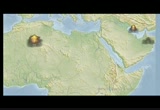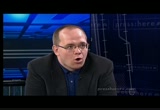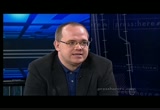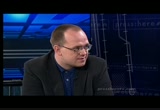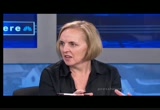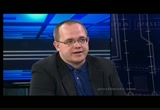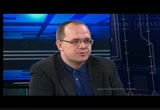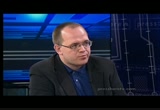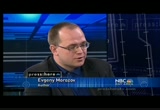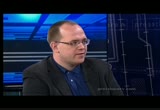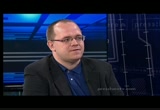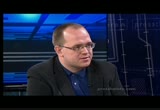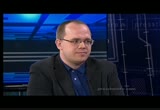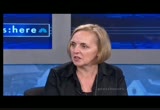tv Press Here NBC March 13, 2011 9:00am-9:30am PDT
9:00 am
>> what credit should facebook and twitter really take for unrest in the middle east? why don't dictators use the power of the internet the way the rebels do? we have the authority on dictators and data is my guest this week plus the ipad at work. employees want it. enterprise resists. reporters from "the financial times" and bbc this week on "press: here." >> my first guest is one of the few experts in that strange
9:01 am
intersection between politics and the internet. a dictator, disaffected public and facebook all meet. it's been a lousy start to the year if you're a dictator. a spring of discontent in egypt where a google exec used facebook to rally a revolution to tunisia, jordan, algiers and of course bloody libya. in each case egypt especially the press credited twitter and facebook located a world away in northern california as the primary tool for revolutionaries. in egypt especially that seems to be correct. >> it would take you weeks if not months to identify who is connected to each other. >> the author published a book
9:02 am
about a scenario just weeks before all hell broke loose in the middle east. called "the net delusion" it exams the role of internet in uprising. you are a visiting scholar at stanford and a fellow at the new american foundation. when you write this book, it's about the middle east and revolution and social networking. your conclusion, if i may take your entire work into a sentence, is that social networking does not necessarily strengthen or create or enable revolution. and then egypt happens after the book comes out. did egypt prove or disprove your book? it seems like if you summed it up in one sentence it disproves
9:03 am
the book. you just wrote "we have nothing to fear from our japanese neighbors." >> there are a lot of tools that can be useful and the communication tool is always one of them. clearly it's not just the tools that you need to have a successful revolution. so, yes, when there are millions of people who are already committed to the cause and who are willing to sacrifice their lives, in those moments of course social media can be useful because people already committed to basically dying and sacrificing their lives. >> certainly when you read a thick book, you cover the possibilities. i don't mean to pin you down as to it being this. i said in the book this would never happen. >> i didn't by the way. we knew well before the middle east that you can use media to mobilize people into the
9:04 am
streets. we saw that in colombia in protests against the movement there a few years ago. it was not something new we found out. >> you didn't look at the revolution and say, damn it? >> i didn't. you have to consider many of the cases in the middle east which fail to ignite a revolution. again in syria. it didn't lead to the same outcome that people expected to see based on what happened in egypt or what happened in tunisia. you have to remember that those tools can be useful but you also have to remember they're not perfect. there are many things which we are missing in facebook and twitter when it comes to protecting the identity of the unions and what will happen when the dictators more or less regroup themselves and they start a crackdown, which will happen and which will involve social media. >> they might have their
9:05 am
facebook group, dictators facebook group. are you saying that our interpretation of what happened that it's a facebook revolution and twitter revolution is a romantic notion and somewhat naive? >> that was clearly the case in iran in 2009. the reason i spanned a chapter in the book is that social media is not only used for revolutionary purposes. it is showed it wasn't used in iran and the narrative that surrounded those events in the west prioritized new media while new media was playing an important role in those events. in looking at what happened in the middle east, i think the coverage got better so the media was more strained than crediting the tools over the human actors who clearly played a far more important role. there's a tendency to think that cooperation between activists and tunisia and in egypt was purely virtual and people
9:06 am
discovered those people and looked at each other's facebook profiles. i know myself that they were present at many of the trainings and workshops and some funded by the u.s. government in places like dubai or beirut where they corroborated and met each other and strategically went about pursuing the goals of opposing their governments. >> surely they find strength from one another by finding one another on facebook and on twitter and they knew that their message was getting out to a public. surely that encouraged them. was perhaps social media not something of a tipping point when it came to egypt and because there are so many more people using social media than there were in 2009 in iran. >> well, again, i don't think that we have to focus on the social media as the primary force. the same number of people in egypt using facebook two years ago. the first wave of protests in egypt started in 2008 when they had huge labor strikes in the
9:07 am
country. and they already have hundreds of thousands of people who are using facebook. they didn't ignite political change because the political circumstances were not there. it was tunisia that was the tipping point for egypt. it was not facebook or twitter. >> there's an underlying assumption that authoritarians afraid of their citizens talking to each other. that's not necessarily true. >> that's an assumption i oppose in the book. there are a lot of governments which are allowing them going beyond filter. >> if we could only get them to talk to each other, they would realize how awful it is and take care of itself. >> that's not happening. we see dictators turning to networks to learn about opponents in real time because they can monitor the same online groups and online profiles. that's the main reason why they turned off the internet
9:08 am
entirely. >> was it a mistake on mubarak's part? >> he paid little attention to the internet. i think that's what eventually undid him. he did not develop a strategy of seeing the opponents online. >> he wasn't hearing the background chatter going on in social media. >> look at china. in china if you do not counter the protests online within the first two hours, the situation will get out of hand and you fail. in mubarak's case, it took seven months for that first facebook to galvanize into a social movement. it wouldn't survive on a chinese social networking site for two hours let alone six months. >> they empower revolutionaries as long as the dictator is
9:09 am
asleep at the switch and isn't at school in beijing to learn to counteract it effectively. >> i think it distracts us from fixing the imperfections. we look at facebook that's been credited with helping protesters in the middle east, it does not allow dissidents to use the service. if you are chinese dissident who doesn't want to disclose your name on facebook, his or her profile will be deactivated. a few days ago we saw that zuckerberg's puppy has his own facebook page. in china you need to fax a copy of your passport. >> we'll take a quick break and be back.
9:11 am
>> those who clamp down on internet freedom may be able to hold back the full expression of their people's yearnings for a while but not forever. >> secretary of state hillary clinton talking about the internet and the u.s.'s efforts to spread it throughout the word. one of the experts in where the internet meets protests is the author of "the net delusion." i interrupted you to do a commercial. go ahead. >> you were talking especially in egypt some dissidents were unable to have pages on facebook where they could hide behind an assumed identity to protect themselves in the real world. i raised that in a recent conversation with their chief security officer, joe sullivan. he said the thing about facebook is connecting real people with real people. if you do have people who are out there on facebook with fake identities, then you just ruin
9:12 am
the whole thing about what facebook is about. >> facebook's business model in a sense. >> you need to trust in who you're talking to. that's what he was saying. there may be very good reasons and the police for example are one group of people that complain you took down my fake identity on facebook because they are reasons to be there to catch a pedophile or whatever. >> it doesn't have to be that black and white. facebook can preserve their polarcy if they want. in russia they asked to fax them the first page of his passport while he was in siberia in jail because they weren't sure that was him. even if you look at egypt, what happened there which helped to organize the protests, sometime in october or november, that group was the activator because
9:13 am
facebook had to come up as a quick fix. >> the very facebook that helped launch the tunisian revolution. >> egyptian revolution. again, all i'm saying is that there are many cases -- looking at that group in egypt, it was clear it was a political group that sought to oppose mubarak. i don't see why facebook has to enforce that policy. it's not that they would have trouble with securities and exchange commission if they don't enforce it. there are ways to push companies to behave responsibly. >> i want to follow-up on the secretary of state's remarks. the u.s. has given some funding and thanked twitter and asked twitter not to go down for repairs during a crucial time earlier in the middle east. it's been a supporter of some of these things.
9:14 am
should they be discriminatory and provide things for tour which can disguise location of user. it was interesting. the usage went up during the egyptian uprising but not to the extent that you would think. if i was in dissident business in egypt, i would be excited about using twitter and facebook only if i could protect where i was falling in from. >> answer the question. disguises your identity online. >> it's a proxy server. it hides where you are coming from. >> authorities can't tell where i'm going? sorry. i thought someone would say what did he say? >> the state department has been fighting it for some time now. it's not that it's a new problem for them. they do know that such service exists. the reason they're not found more aggressively is law enforcement and intelligence gathering community do not actually want it to work perfectly because if it starts
9:15 am
being a perfect follow to disguise identity, it will be abused by all sorts of other actors. that's why it's working slowly and can work faster if you pour a million dollars into it. you'll have a load of people in fbi being unhappy with what the state department is doing. you have to understand that it has its roots in the hacking community. of people who actually, you know, do a lot of things which are not always perfectly legal. you have at some point overlap of personnel working for wikileaks. again, once it intenters the picture, it's difficult for the state department to fund it when there are people with how the tools are being used. >> there are a few things that verge on hypocritical shall we
9:16 am
say. >> wikileaks in particular. >> hillary clinton is not known for her support for wikileaks. >> if you looked at her speeches and just thought wikileaks the whole time, you could think she was talking about wikileaks in support of it. >> yeah. there is a couple of different ways that the u.s. tends to look at these things and things that are good in egypt or iran or places we don't like very much and very different here. i wanted to ask you about one of the things that's interesting about the internet is it spreads not only information all low wikileaks more broadly than before in publishing tools but hacking ability thinking of unanimous which has gone from -- it was around before but reached prominence attacking businesses not sufficiently supportive of wikileaks but now appears to be actively hacking companies and threatening to do so the u.s. military. are we going to see
9:17 am
cyberactivism in these countries where are revolution movements that could benefit from it? >> to me what's interesting is that if you look at the coverage of cyberattacks in the media, there is more attention being paid to unanimous than to an entity called iranian cyberarmy which are hackers from iran that go about hacking every single western outlet that doesn't like ahmadinejad. they recently broke into the voice of america's website for example funded by the u.s. government. there's an element of growth and not just those we characterize as cyberactivists where we assume that those guys are fighting for freedom of information or fighting for freedom of expression. there are many others as we have seen with hackers in russia, in china, who are actually causing more harm than good.
9:18 am
when i think there was a load of activists who are trying to promote information and you'll see a lot of backlash. look at iran in 2009. we did see a lot of activists who wanted to hold the cause by attacking websites of the iranian government. in the end they would slow down the internet in iran for everyone else. even people protecting in the streets have trouble getting photos and videos online because the entire internet was clogged because of this well meaning activists who wanted to withhold democracy. >> what would your next book be about if you were able to predict so much of this? >> two books? preliminary title is "fear the gifts." i want to look at how some of the same cyberlogic works its imagine when you apply it to liberal democracy.
9:19 am
i'll look away from china and russia and focus on what do ideals of transparency and organization mean for democrats if they go to the extreme. >> thank you for being here this morning. you want to use your ipad at work and work wants you to use anything but. the fight to use apple products in old school enterprise when "press: here" continues.
9:20 am
welcome back to "press: here." by now you may have your brand new ipad 2 and you can't wait to bring it to work. work may not be so excited. in a recent online survey, one-fifth of all respondents say their companies don't allow ipads to be used at all. other companies resist apple products like iphones more passively by giving employees
9:21 am
blackberries and blocking out all of the other gadgets for accessing work e-mail. why is enterprise so resistant? steve king deals with security in the enterprise all the time as ceo of docusign. entrepreneur of the year sort of like the oscars for the business. joined by maggie shields of bbc and joe from "financial times." so my company won't let me use an iphone. whose fault is that? is that apple's fault? my company's fault? mine for not convincing them? >> i don't think it's any one person's fault. i do think that many large enterprises are missing a fantastic opportunity to leverage power of apple products. >> when someone is missing something, it's maybe not their fault. tv guys like to point a finger at somebody. why does it need to be fixed? why can blackberry walk in and say we can supply you and apple has more trouble? >> you know, i was a blackberry
9:22 am
user. i had my first one in 2000 and used it for ten years. thought it was the only choice for the enterprise. when i got to docusign, i was c converted to the iphone and ultimately the ipad by the i.t. group who says it's as secure as a blackberry. the ipad or iphone or blackberry is just a device. any device unmanaged from a security point of view is a risk. so i wouldn't advocate that ipad is for every corporation and every application. i would advocate you manage an ipad like any device with proper security policies, procedures and methods to ensure that it is
9:23 am
secure. >> people within companies are changing the culture. i know at the bbc i have a blackberry but they are moving toward allowing you to have an iphone to access your e-mail, et cetera, on the iphone and there are some applications you can use on the iphone to broadcast direct from the iphone to the radio stations at the bbc. it's the employees that are forcing the situation because they are bringing this stuff in. it's a case of security people and enterprise just have to catch up and make it work. this is what people want. >> we agree. we call it the consumer to business tornado that's occurring. the ipad, i brought my ipad here, is such a powerful device for the mobile workforce. we provide the number one service for capturing signatures and managing documents in the cloud. it's the fastest, easiest most secure and reliable service to use. >> as an i.t. guy or c.i.o. of
9:24 am
my company i come to you and sa they want to use ipads and iphones. these are secure presuming we put the right software on it and these are secure and these are just as secure as anything else. >> if you take advantage of the tools that apple provides, provider access lock, the ability to wipe the data off the ipad after a number of unsuccessful access -- >> can i do that on my blackberry? >> yeah. they can remote on. >> i can't but an i.t. guy can. continue. >> the ipad can be as secure as any device and be incredibly powerful. for our application we have a true enterprise class business application on ipad and iphone. it's something that a field salesperson can use to replace cumbersome hardware that they have to carry and be a lot more
9:25 am
familiar than those devices for signing and managing documents in the cloud. >> i think one of the interesting things is that apple professes shock and amazement at how well the adoption curve is going in the enterprise. they've been working on this stuff for a long time. they put in remote capabilities and ability to force updates on everybody at once and have gone a long way. the enterprise a lot are carrying the ball themselves by designing their own apps only for their employees to use. it's a powerful trend. >> i was just going to ask you where you think google and android play in this. apple has direct control over the store. much more hands-on approach. on the other hand, it's not as easy to write for in some ways as android is. do you have a sense of which horse is going to win a few years from now? >> i won't predict a winner. i do believe that google a
9:26 am
and android will be on the heels of apple to provide tools so the enterprise can use their devices. >> he said heels. that would be apple. >> so in fact we have an android app and we are seeing tremendous activity in our customer base wanting mobile solutions using either ipad or other tablet devices. >> it shouldn't be an either/or but provided for everybody to bring in whatever device that works for them. >> android, ipad, windows device. >> just as a final thought, i think one of the things that astounds me that apple isn't used more in the enterprise although you say they work hard on it, they are so good in education. i'm a huge consumer fan. they own the creative space. it's kind of the one spot where they still have room to grow. i'll put it that way.
9:28 am
that's our show for this week. thanks to our guests. the book "the net delusion" is in bookstores but you can find his work in everything from foreign policy magazine to the economist. if you would like to spend an afternoon, google his name and start reading. i'm scott mcgrew. thank you for making us part of your sunday morning.
82 Views
IN COLLECTIONS
KNTV (NBC) Television Archive
Television Archive  Television Archive News Search Service
Television Archive News Search Service 
Uploaded by TV Archive on

 Live Music Archive
Live Music Archive Librivox Free Audio
Librivox Free Audio Metropolitan Museum
Metropolitan Museum Cleveland Museum of Art
Cleveland Museum of Art Internet Arcade
Internet Arcade Console Living Room
Console Living Room Books to Borrow
Books to Borrow Open Library
Open Library TV News
TV News Understanding 9/11
Understanding 9/11
